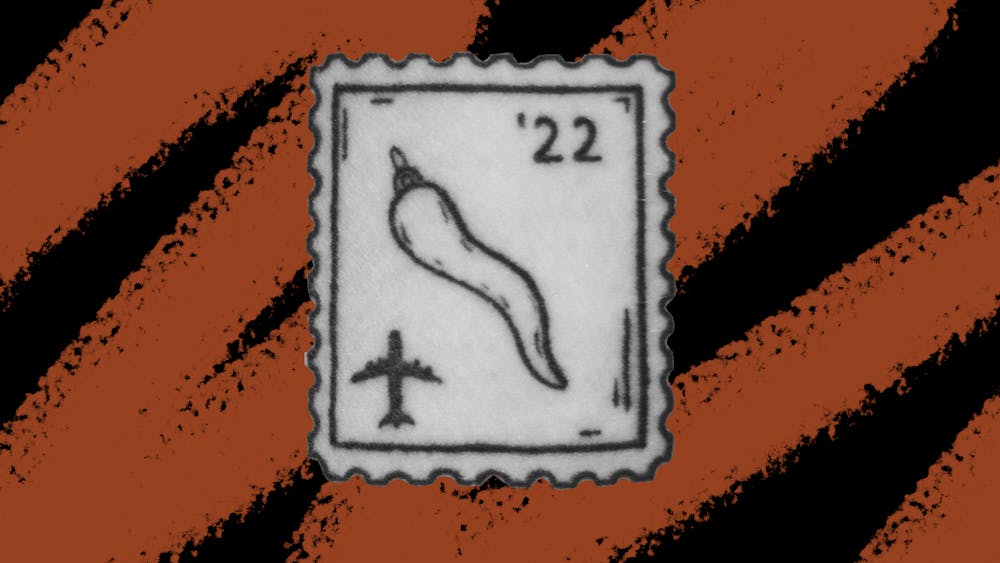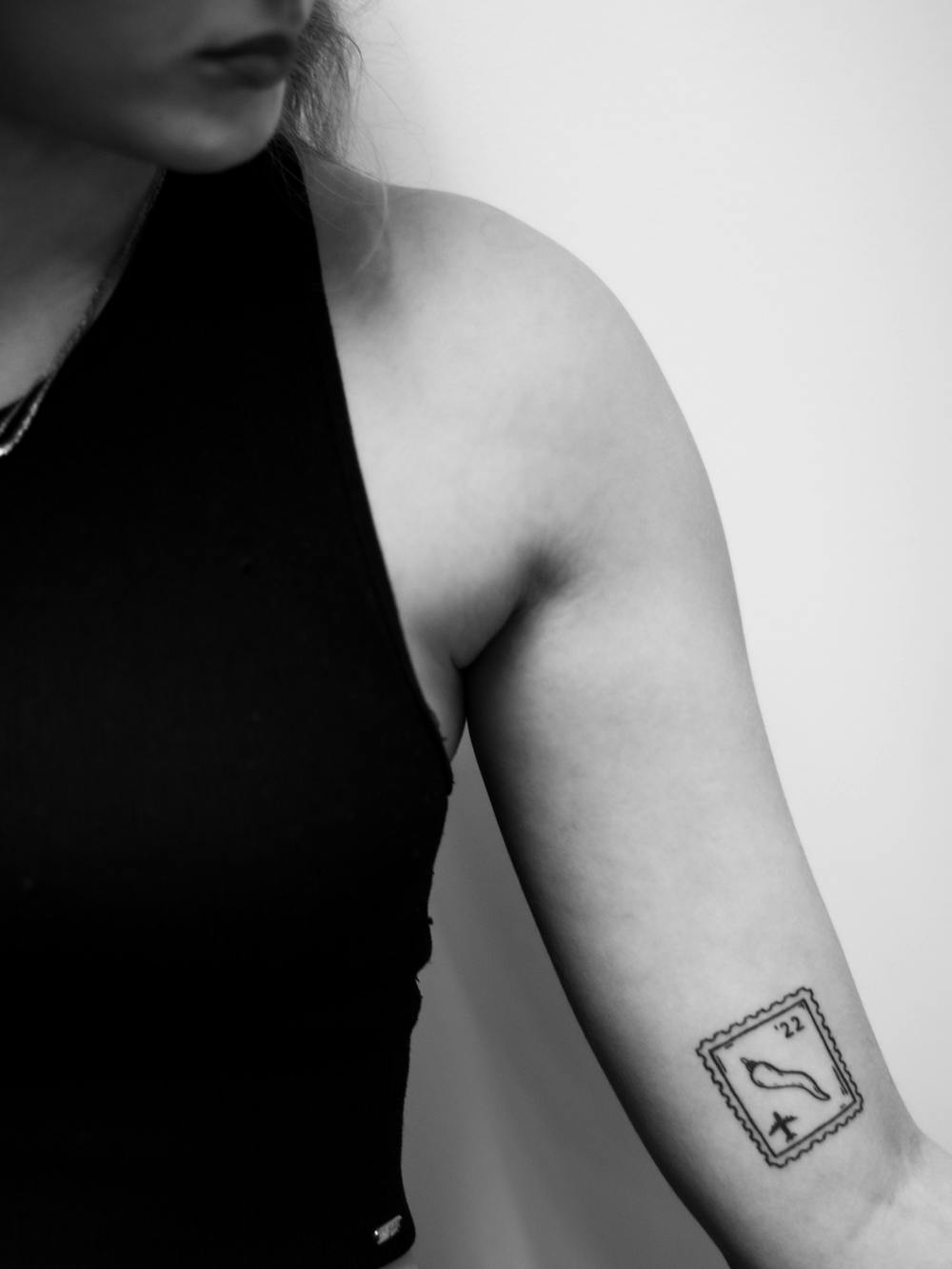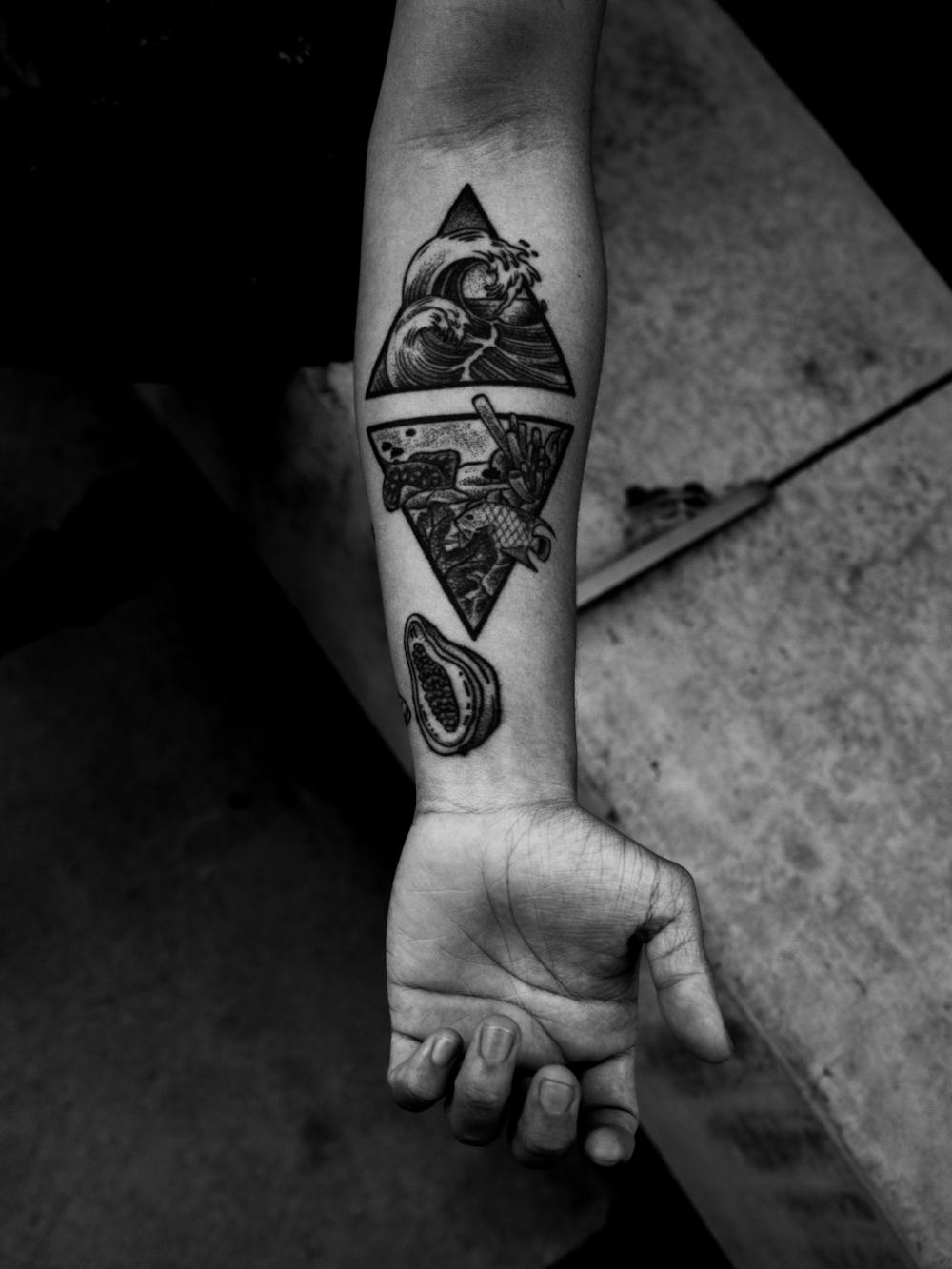State Press Magazine spoke to three University students compelled to wear aspects of their culture on their skin every day. Sophia Crevelt, a junior studying journalism and mass communication, shares a tattoo stemming from a trip to Italy that reconnected her to her Italian heritage. Allison Hawn graduated from ASU in 2022 with a Ph.D. in communication and is a tattoo art historian. She bears traditional tattoos from the Indigenous people of northern Scotland and perpetuates what it means to be Pict. Sasha Park is a senior studying biological sciences, conservation and ecology. She describes how her tattoos helped her come to terms with her body as a trans woman and explains her interest in a niche culture.
The following conversations have been edited for brevity and clarity.
Sophia Crevelt
When did you get your tattoo?
I got it the second I came back from my first trip to Italy with my mom because my mom is from Naples. I went on vacation last summer with her. I saw where she grew up, and I finally met my family in Italy for the first time. It was a thing of connecting with my culture and opening my eyes to what travel can really do for somebody, so it's very meaningful.
Where is your tattoo and what does it depict?
It's on my arm. It's actually the same thing as the necklace I wear all the time. It’s called a cornetto or cornicello, but it just translates to "horn." It's like a little horn pendant. It's an Italian talisman, similar to how in Greek and Turkish culture there's the Evil Eye. It's like a spiritual protectant.
People say it looks like a red chili pepper. People are always like, "I love your chili tattoo," and I'm like "thanks." I got it as a little postage stamp because I was traveling for the first time, so there's a plane and then there's the number 22 because that was the year that I went.
What does it mean or represent to you?
It definitely represents my mom, my tie to her culture and my overall heritage, and meeting my family in Italy for the first time, so there's pride in that. There's a lot of learning that comes with it because I am Italian American, and I've been here my whole life in Arizona, so it's just like a dedication to wanting to know more and continuing to delve into my family's culture.
Why did your mom immigrate from Naples?
It's an interesting story. She is an Italian immigrant. She came when she was 27. It was before she had my brother who was born in '99. She was born and raised in Naples, and she was studying law — she was a law student and she worked in the law offices there. Then her mother, my grandma, traveled to Arizona or Las Vegas — somewhere in America — on vacation, and met someone and decided that she was gonna get married.
Then, when my mom visited her mother in America, she also met someone, who was my father, and they decided to get married. So my mom traveled over here and started a new life. And that was the first time that she had gone back, was our trip together recently.
When did you know that you wanted to get the tattoo after the trip?
I knew long before that I wanted to get it, but I didn't know what. I knew I wanted something to commemorate my first vacation with my mom to Italy, and then when I got there, I noticed how prevalent [the symbol] was. I've had this [necklace] for a few years, but it was like every street corner had somebody selling them — every jewelry shop had somebody selling them.
Everyone had them on their cars — my cousin herself had four hanging from her neck. I think she was working on school stuff, so she wanted extra good luck. But it was very much always around in Naples specifically. So, I was like, "this seems like a good icon of the whole trip and the whole city."
Allison Hawn
Can you share some of your cultural tattoos?
My family is Pict, which is the Indigenous people of northern Scotland, and we've been getting tattooed for centuries. The inside of my ear is tattooed, and if you know how to read that, it tells you roughly how old I am.
On this arm I have a family crest. The wording up here basically translates to "success nurtures hope." Because of the area that we lived in, because of who we are, we resisted British repression for a very long time, so it's nice to have that connection back to that.
This one is a Z-rod. We've got two circles that represent the interchange between air and water. This at the top is a tree with a sphere at the bottom pointing downwards, so this is actually the sign that you're in a friendly or safe territory because the spear is planted in the dirt and the tree is growing up. A lot of the tattoos and designs that were done by my ancestors and by us today have to do with our relationship to nature. They have a lot to do with our relationship to what we were seeing in the world and specifically the ways that things interact.
That is a boar. Boars are considered dangerous. There's a lot of people who would much rather face up against a bear than they would a boar. So, I got this one when I completed my Ph.D because I decided I was going to be a force to be reckoned with.
I've got my grandmother's favorite tea cup with a slight variation of a Wadsworth poem. I got that poem because she had such an impact on my life. We are a matrilineal culture, in that we get a lot of our under- standing of who we are through the females in our lives, which is kind of counterintuitive to a lot of American culture.
Is there a certain name for this style of tattooing?
Traditionally, it was called woading, and that's because of the blue color that it comes from. It was made out of a certain kind of plant. Traditionally, they would have been stick-and-poke tattoos, but it's very hard to find a tattoo artist these days who wants to do a stick-and-poke tattoo, and frankly, I don't want to sit through it.
Why was it important to you to get these tattoos?
My family is Pict on both sides, so there's a strong cultural identity there. I grew up in America but with a lot of influence from culture because we're a very insular group. It's also vitally important to keep the traditions alive because much of our land — we were removed from our lands by colonizers. There was a lot of destruction of our history, and in fact, a large majority of our cultural artifacts can only be seen behind glass in British museums, which is unfortunately the state of a lot of cultures around. So, (these tattoos are) a way for me to respect my heritage, respect my ancestors, respect people who came before me and also keep a piece of that with me because I can't actually experience that culture on the same daily basis that I would have prior to all of that.
Sasha Park
Can you share some of your cultural tattoos?
This is a fish person down here, and then this is a mushroom person up here, and it's designed to be androgynous. It focuses on themes of duality, as well as masculine and feminine. It's inspired by salmon in the Pacific Ocean. When salmon spawn, they go upstream, and it represents a connection between land and sea. When the salmon run, it's a huge feeding event for a bunch of different organisms out in the forest. Obviously, the forest is the habitat where the salmon babies started to grow and make their way to the ocean, and so it was designed to represent those sorts of connections in ecology.
This one has fungi on it — I just love fungi. I have another one, it has a frog with mushrooms growing out of the back. I just thought that was cool, and I'm interested in mycology. Most of my tattoos are nature-related. But this one I got when I was questioning my gender identity, and it was important for me to have stuff that appeared more feminine and delicate. Tattoos were a big part of me coming to terms with my body.
Was there a certain point in your life when you got these tattoos?
This one right here — I got this in 2021. My dad's Korean and my mom's Indian. This is a dude that I saw in a sketch from Korea, and the flowers are native to the part of India that my family's from. This one, it's a fish scene here and a wave up here, and it also has some duality themes. I got it when I realized that I really love nature.
There's a specific diving trip that it's inspired by and the fauna are from this trip. It's this idea that something that's so chaotic and hostile to human life is something that's teeming with life for other organisms. The very first tattoo I got (was) this one. That's like a volcano with coordinates. I spent six weeks in Ecuador in a community in the Andes when I was 17. It was an experience that showed me how independent I could be, and I didn't want to forget that.
For the tattoos that describe nature, do you share a connection to those stories?
I would say yes, but it's honestly a little kind of complicated. Ever since I got my first tattoo, I wanted to get more, and I don't know if the meanings that I came up with for these tattoos were more of a justification to get the tattoo or a deliberate meaning. I definitely resonate with the stories now. When I got them, I don't know. Something I've learned about my experience with tattoos is oftentimes, I have pieces of flash, but over time they've gained meaning to me even if they didn't have meaning when I got them.
Why was it important to you that you got a tattoo that represents your Korean Indian identity?
Due to a couple of different aspects about my identity. Being Asian in America, or also not being "fully" Korean or "fully" Indian, or also just being trans, I've always felt that I've walked between two different worlds. Like, I never really fit in with the Korean immigrant community. I never really fit in with the Desi community. It was just difficult to find a community that I could relate to, and it was difficult for me to be proud about the cultures that I had come from. And so this was one way of trying to regain that a little bit.
What function or purpose do your tattoos serve?
Honestly, I love showing them off and the attention that I get from them. I don't go out of my way to seek it, but if someone sees my tattoos and asks me about them, I love talking about them. It's like a fun, starter conversation piece. But also, going back to my relationship with my body, I got some of these when I was really depressed and the act of tattooing releases all these endorphins and adrenaline and it makes you feel really good for a little bit.
But I talked about getting in touch with my body. And I guess the reason I'm not opposed to getting tattoos, especially being young, is that I figure as I get older, even if I don't necessarily feel like the tattoos represent me, they still are a reminder of who I was at one point.
How do your tattoos represent culture? What does culture mean to you?
With the trans community, there's a sort of different culture there. Being trans you have to deal with things a lot of people aren't familiar with. And so once you find a community that can understand that, it's really nice, and it's like you're finally running into an identity when you realize that you're trans.
Before I came out, I would always ask myself, "what is my identity?" Like, I don't really feel like I had an identity. But as soon as I realized, it's like it makes sense. Now this is it. And I feel like culture is tied so closely to identity. I guess these tattoos have helped me form my identity, and have been important in that way to me. So I guess that's the connection to culture for me.
Edited by Sam Ellefson, Camila Pedrosa, Alexis Moulton and Greta Forslund.
This story is part of The Culture Issue, which was released on Feb. 8, 2023. See the entire publication here.
Reach the reporter at savannah.dagupion@gmail.com and follow @savdagupion on Twitter.
Like State Press Magazine on Facebook and follow @statepressmag on Twitter and Instagram.

Savannah is a senior studying journalism with a minor in English. This is her seventh semester with The State Press. She has also worked at the Lonely Planet and Write On Downtown.









